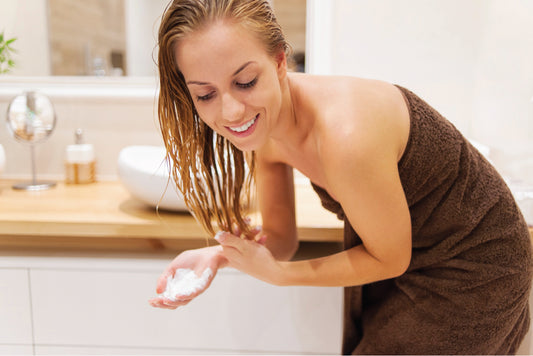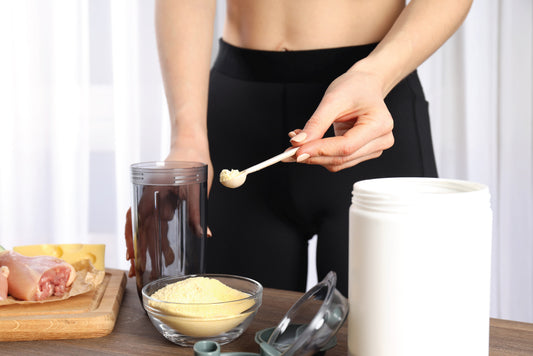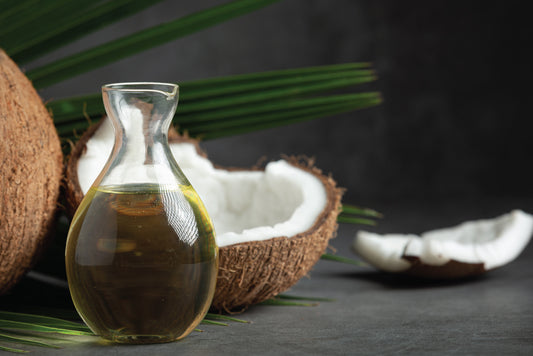It has been a while since you've been to the beach. The salty water and natural oils are still on your body, aren't they?
Do you recall the state of your hair when you left?
If you're lucky, you will be able to take some memorable beach waves home with you!
In addition, you may have felt heavy oils and dry hair roots in your scalp.
So, is salt sea water healthy for natural hair, or is it a bad thing?
Is salt water good for your hair?
For the most part, yes…
But let's take deep dive into how salt sea water (commonly found in ocean water) is a healthy hair essential.
Table of Contents
- Is It Fact Or Myth?
- What is seawater composed of?
- Is Salt Water Good For Your Hair?
- How Does Salt Water Support Hair Growth?
- 5 Hair Growth Benefits of Saltwater
- Natural Shampoo That Purifies Your Hair Naturally.
- Boosts Hair's Density
- Promotes the Growth of Hair
- Adds Vitamins and Minerals to the Hair
- It helps with dandruff and an itchy scalp
- Is Too Much Salt Water Bad For Your Hair?
- Is salt water bad for colored hair?
- 3 Negatives Side Effects of Using Salt Water
- How To Manage Salt Water On Your Hair?
- 5 Ways to Keep Your Hair Healthy In Salt Water
- Sea Salt Spray Treatments
- Final Words
- FAQ's
Is It Fact Or Myth?
Is salt water good or bad for your hair?
Is it a good idea to use salt sea water as part of your hair treatment regimen?
Water and salt have a variety of characteristics that work together to promote hair growth in several ways. In simple words, salt water is considered one of the perfect hair growth hacks.
What Is Seawater Composed Of?

Seawater comprises mostly of water and contains salt and a lesser proportion of other substances.
The minerals come from various minerals that dissolve in the seawater through the water cycle. In addition to sodium ions and chlorides, there are 93 more elements in the system that can be found.
This material comes from different activities, which include the chemical composition of water, dissolution of biological material, sediments from the ocean's bottom, and water runoff.
Salinity – salt concentrations of seawater vary according to where they come from.
Is Salt Water Good For Your Hair?
Salt water is good for your hair and scalp! But just as salt water can cause dry skin, excessive salt water exposure can dry out your hair.
If you've ever gone swimming in the ocean and submerged your hair completely, you may have noticed that it's not easy to comb out the next day. The water in your hair helps keep it hydrated, elastic, and moisturized.
Not only is salt water good for your hair strands, but it also provides some benefits to your overall body. Ocean water also has a high concentration of essential minerals to help improve your circulatory system and stimulates blood flow.
How Does Salt Water Support Hair Growth?
Saltwater is a natural source of vitamins and minerals for your hair. Particularly high in potassium, sulfur, and magnesium, these nutrients can have a beneficial effect.
The natural exfoliating properties of sea salt make it a good exfoliant for the scalp. For oily or greasy scalps, this is a great way to boost thick hair growth strength and development.
5 Hair Growth Benefits of Saltwater

Using salt water to wash your hair has several benefits, including the following:
-
Natural Shampoo That Purifies Your Hair Naturally
Use saltwater on your hair now and again for cleaner, lighter, and smoother hair. As a clarifying best healthy hair shampoo, salt water is an excellent choice.
It removes all of the oil and sebum buildups that contribute to oily hair. When shampooing your hair, product buildup might be difficult to eliminate.
-
Boosts Hair's Density
Use a combination of one tablespoon of sea salt and 200 ml of water to give your hair some volume, then spritz it on or use it as a final rinse after conditioning. If you have fine, thin hair, this is an effective approach to give you thick hair growth.
-
Promotes the Growth of Hair
Using a combination of salt and healthy hair oil to massage your scalp every week can help prevent hair loss. Salt stimulates hair follicles by opening the pores on the scalp.
In addition to boosting hair development, salt water can help to stop hair fall, treat itchy and flaky scalps, increase blood flow, and supply the scalp with nutrients.
-
Adds Vitamins and Minerals to the Hair
Salty water has many vitamins and minerals, like potassium, selenium, and magnesium. When absorbed into the scalp, these minerals and vitamins help hair grow and improve hair health. Ocean water can also help eliminate harmful things in your hair, like mercury.
-
It helps with dandruff and an itchy scalp
Saltwater has antifungal and antibacterial properties that help treat fungus-related scalp problems like itchiness, eczema, and dandruff. It gets rid of dead skin on the scalp.
You might be surprised to learn that salt crystals can be used to clean the scalp. When done once in a while, this process opens up the pores on the scalp to help hair grow, get fuller and improve hair texture.
Is Too Much Salt Water Bad For Your Hair?
Salt water is good for your hair, but too much of it can be bad for your hair growth.
This is especially true of seawater, which has a lot of salt in it. Your hair can quickly go from having waves you're excited to show off to look dry, brittle, and "dead."
Salt can get rid of moisture. This means that it takes moisture from the air around it. When your hair is exposed to salty water for too long, it starts to take moisture from your hair strands, leaving them dry.
Is salt water bad for colored hair?

If you've dyed your hair, you should avoid getting it wet with salt water as much as possible.
When you spend too much time in salty water, it becomes a hair growth challenge that changes the structure of your hair and makes it fade, dry out, and split at the ends.
Using salt water for colored water causes hair damage like split ends and moisture loss. It's recommended to avoid using salt water for colored hair, as they are likely to fade color hues away with aging.
If you use diluted water, there is nothing unsafe or dangerous to your health. It's easy and cheap to apply diluted saltwater on colored hair and use it to rinse off hair.
When it comes to your coloring, it is possible to wash your color-treated locks with vinegar. This neutralizes the color, highlighting the beauty in this tone.
3 Negatives Side Effects of Using Salt Water
Dry & Brittle
When you swim in salt water, your skin dries out, and so does your hair. The water in the hair is what keeps it moist and flexible. Seawater has a lot of salt in it, and those salt crystals will pull the water out of your hair, leaving it dry and brittle.
Ruins Dyed Hair
If you've dyed or bleached your hair, the crosslinks in its structure have already been changed, and salty water can worsen that problem. Overexposure to seawater can fade or change the color of your hair, as well as make it rough, split, and break.
Loss of Moisture in Hair
The salt is hygroscopic, which attracts more water to your hair, making more salt crystals. However, this process removes moisture inside your hair strand, leaving it dry and brittle. This also weakens the crosslinks between cysteine bonds, which makes the hair more fragile.
How To Manage Salt Water On Your Hair?
If you take a few simple precautions, swimming in salt water doesn't have to make your hair dry, brittle, knotted, and impossible to manage.
Before and after you go to the beach, try these tips to keep your hair healthy and shiny:
Use a conditioning treatment on your hair before you wash it to give it more elasticity and deeply condition it before you expose it to harsh salt water.
If you color your hair, the sun won't be able to make the color fade.
5 Ways to Keep Your Hair Healthy In Salt Water

Following are some major ways to keep your healthy hair alive.
Use Fewer Hot Tools
This summer, don't use your blow dryer, straightener, curling iron, or any other hot tool (and all the time).
If you use a hot tool on your hair and swim a lot in the summer, your hair will get very dry and break and split a lot.
Take a Shower Before You Swim
Your hair is sponge-like. When you go swimming, the chlorine or salt water dries out your hair because it soaks up all the water.
If you shower before swimming, your hair will be full of water, making it less likely to soak up chlorine or salt.
You can also put a leave-in conditioner on your hair to help keep it from drying.
Use a Spray to Keep You Safe
So get some UV protection spray the next time you go shopping for sunscreen. They are easy to use and protect you from the sun. Some of them even protect you from chlorine.
Use a Swimming Cap
Not everyone likes swim caps, but they are a great way to keep your hair safe. Putting on a swim cap will keep your hair from getting wet while you swim. You can wear a swimming cap after some time so your hair doesn't get damaged due to excessive salt water.
Put on a Hat
So you don't want a swim cap? Why not wear a hat? Wearing a hat with a wide brim will not only protect your face and neck, but it will also keep the sun off your scalp. The saltwater will not flow off your scalp's moisture.
Sea Salt Spray Treatments

There are a lot of products that allow you to get the full benefits of salt water for your hair. Most noticeably, salt water sprays for your hair.
DIY Salt Water Sprays
With only three simple items, you can produce your sea salt spray at home in no time! It can be done in less than five minutes.
Ingredients
-
Sea salt, around 1-2 tablespoons (the more salt, the more texture) Alternatively, you may use simple salt instead of sea salt to keep your hair from drying out.
-
1 tsp of coconut oil.
-
To make this recipe, all you'll need is a spray bottle filled with 1 cup of warm water.
How To Prepare
-
Take a cup of water and heat it.
-
Add coconut oil and sea salt to the mix.
-
Spritz your bottle with sea salt spray now.
Final Words
In conclusion, is salt water good for your hair? Yes, salt water promotes thick hair growth!
It also improves hair texture, but excessive sea water use can damage your hair. It's a fact that proper use of salt water is good for hair health growth.
FAQ's
FAQ #1: Should I rinse salt water out of my hair?
Yes you should because it can become so dirty and brittle if you leave it on your hair for too long.
FAQ #2: Is salt water damaging to the hair?
Salt is damaging because it drys your scalp and leaves your hair dry. A lack of moisturization on your hair causes split ends to break and hair loss.




